Course on Identity and Mission of Jesuit Higher Education Institutions
The Canisius Formation
The Kircher Network’s Formation course on Identity and Mission of Jesuit higher education institutions – The Canisius Formation – is an introductory immersion experience for faculty and staff of the Kircher Network member institutions who want to gain a foundation in Ignatian identity and spirituality and Jesuit higher education mission.
Through the course, participants obtain a foundation in Ignatian identity, spirituality and mission; gain a foundation in the core characteristics of Jesuit higher education; and develop a sense of belonging to a European and global Ignatian community with a mission beyond the university/centre.
Speakers
José García de Castro, SJ.; Gonzalo Villagrán SJ.; Joseph F. Mària, SJ.; Patrick Goujon, SJ.; Ángel Benítez SJ; David McCallum, SJ.; Carlos Losada; Philip Geister, SJ.; and Susana Di Trolio.
Methodology
The course seeks to be an integral experience comprising intellectual, interiority and relational approaches. Through the course, the participants will be invited to rediscover their jobs as a chance to contribute to the mission of Jesuit higher education.
This experiential approach follows the best tradition of Ignatian Pedagogy. The course combines three-day in-person sessions in Vienna with three online meetings. Distinguished experts will give lectures and lead discussions with participants in Ignatian spirituality, Jesuit mission, Jesuit networks and Ignatian Leadership.
The course will include readings and materials, all of which will be available on the webpage. Participants will have time for reading and in-group discussion during the course.
Location of the in-person sessions
Loyola (Basque Country, Spain) | October 21st-23rd 2025
Location of the on-line sessions
Pre-session – Introductory webinar
Date: Oct 3rd 2025, 15:00 – 16:00 (CET)
Follow-up webinars on Ignatian Leadership
Ramón García and Esteban Mogas| Date: Nov 5th 2025, 18:00 – 19:30 (CET)
David McCallum, SJ. | Date: Nov 12th 2025, 16:00 – 17:30 (CET)

Azpeitia, Loyola (Basque Country, Spain)
An invitation to a networking formation experience in Jesuit Higher Education
Course Elements
Nominating process
The Kircher Network offers the course every year to the faculty and staff of Jesuit institutions in Europe and Lebanon. This year will be the secong edition of the course. Institutions should send their candidates’ names and email addresses to kirchernetwork@jesuits.eu

Who was Peter Canisius?
Peter Canisius (Nijmegen 1521-Friburg 1597) studied at the University of Cologne, where he met Peter Faber, one of St. Ignatius’ first companions. While in Cologne, he did the spiritual exercises with Peter Faber. As a result, he entered the Society of Jesus in 1543, being the first Dutchman to become a Jesuit. He was the first Provincial of the Province of Germany of the Society of Jesus. He was sent to Vienna as superior of the Jesuit community in 1553 following the death of Claud Jay. As the main line of his pastoral strategy, following the demand of King Ferdinand I, Peter Canisius wanted to invigorate the University of Vienna and make it attractive by appointing professors who could apply Jesuit teaching methods and through the good example of successful Jesuit scholars. He was also named a member of the university reform commission. In 1562, he founded an institution that would later become the University of Innsbruck.
COURSE ELEMENTS
Course Components

Key moments in the life of Ignatius of Loyola as a reference

The Jesuit understanding of the mission and core characteristics of higher education institutions

The Jesuit higher education network ecosystem

Key elements of the Ignatian Leadership approach

COURSE ELEMENTS
Program
Preliminary program available here.
Course Elements
Materials
COMING SOON
- General information
- Pre-session Webinar (Introductory)
- Session 1
- Session 2
- Session 3
- Session 4
- Session 5
- Post-session Webinar
- Glossary of Terms
Find a short description of each session, a mind map and the materials.
Presentation of the participants, the facilitators, the President and the Executive Secretary of the Kircher Network. A brief introduction to the formation session and the Kircher Network.
Title and speaker
Ignatius until he arrives in Rome. Reflecting on one’s vocation/purpose | José García de Castro, SJ.
Short description
The speaker will help draw experiences from Ignatius of Loyola’s life that can enrich the participants’ lives and professional vocation.
Orienting questions
1. SELF-KNOWLEDGE
a) History.
In Loyola (1521-22), Ignatius awakened the «inner eye» and began to examine his interior world. Through self-knowledge, he started a new «no-return» process in his «new life,» becoming increasingly aware of what was happening inside him.
b) Our world.
Contemporary theories about leadership recognize self-knowledge as the
starting and necessary conditions to guide oneself and others. It is the foundation of prudence and discretion…
c) To reflect:
Am I familiar with my inner world?
Do I exercise my «spiritual tools» to develop a deeper understanding of » who I am» and «how I am»?
Thoughts, feelings, desires, choices/decisions and actions… this is the process… How does this interconnection among these elements work in my daily life?
How do I think we could improve this practice?
2. To CHANGE «MY» MIND
a) History
In Jerusalem, Ignatius realized that his determination and project, as he had dreamt in Loyola, were not God’s dream and will. What had happened? So, he had to restart praying and thinking about the quid agenda. What to do?
b) Our world.
Contemporary Psychological Theories are deepening the complex structure of the human mind, helping people deal with the many inner voices and desires that influence our will and freedom to make personal, familiar, or institutional decisions.
Many times (as Ignatius thought), we are so convinced that / our plans or dreams are not only the unique or the best ones but, for those who believe in God, even the plans or dreams of God for us /me.
c) To reflect.
Do I have similar (personal or institutional) experiences?
How have I/we realized that this was not the proper way?
Suggested readings
St. Ignatius-The Autobiography of Ignatius
The Transformation of Iñigo de Loyola
Mind Map
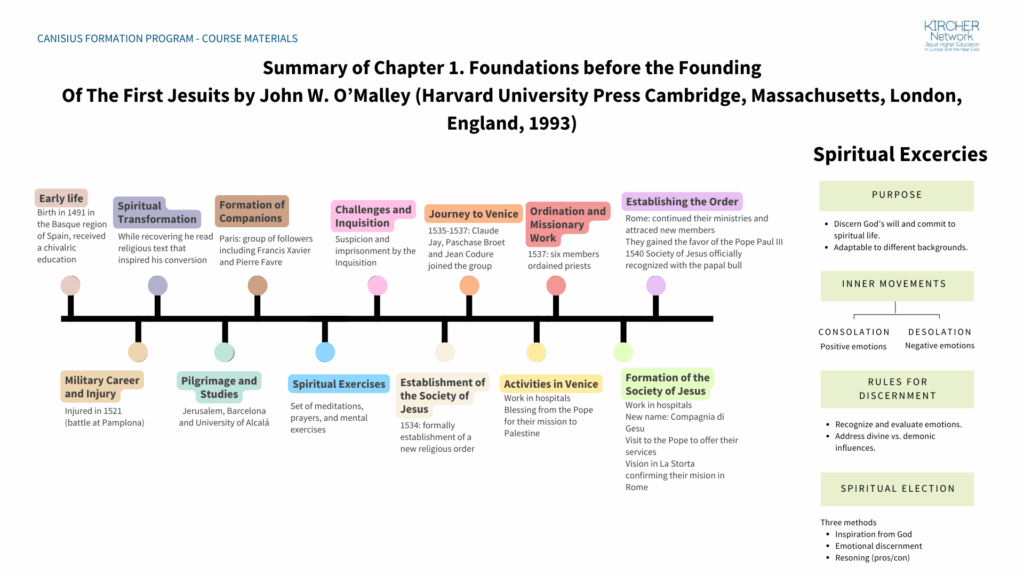
Title and speaker
Ignatius as a General in Rome. Developing our vocation/purpose in institutions | Ángel Benítez SJ
Short description
The speaker will point out lessons from Ignatius of Loyola´s experiences as General of the Society of Jesus in Rome that could help the participants to understand their work in their institutions.
Suggested readings
Article 1: «O’Malley, J. – Saints or Devils Incarnate_99-116» John W. O’Malley
Mind map
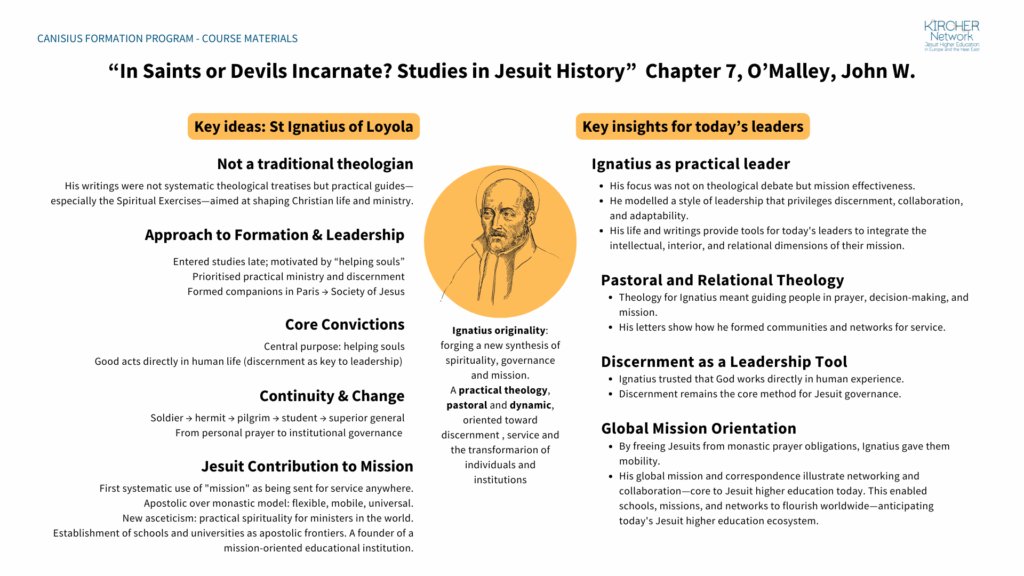
Article 2: «O’Malley, J. – Saints or Devils Incarnate_117-120» John W. O’Malley
Mind map
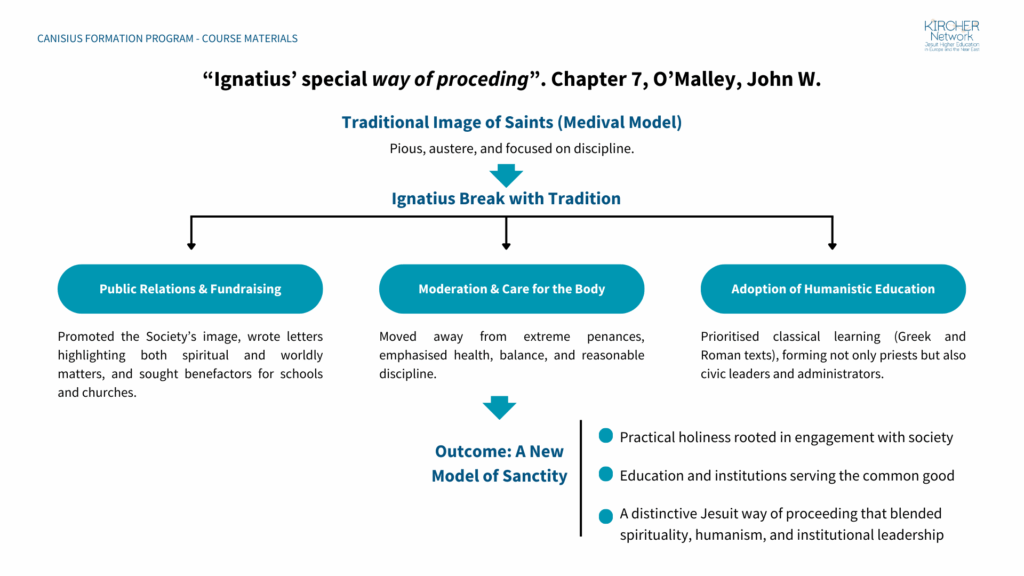
Orienting questions
Title and speaker
The mission of the Society of Jesus and the contribution of Jesuit Higher Education | Gonzalo Villagrán SJ., and Pep Mària SJ.
Short description
To further understand how the mission of the Society and the mission of the University are connected.
Required readings
Article 1: “The Service of Faith and the Promotion of Justice in American Jesuit Higher Education” Peter-Hans Kolvenbach SJ.
Mind Map
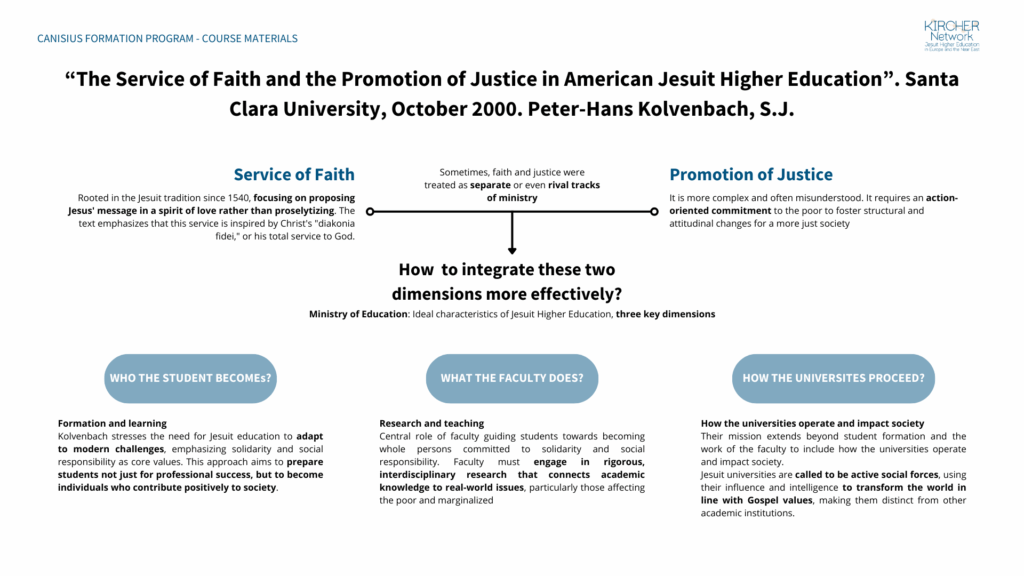
Article 2: “Renewing Our Commitment to a Faith that does Justice” Social Justice and Ecology Secretariat, Rome General Curia, 2005.
Mind Map
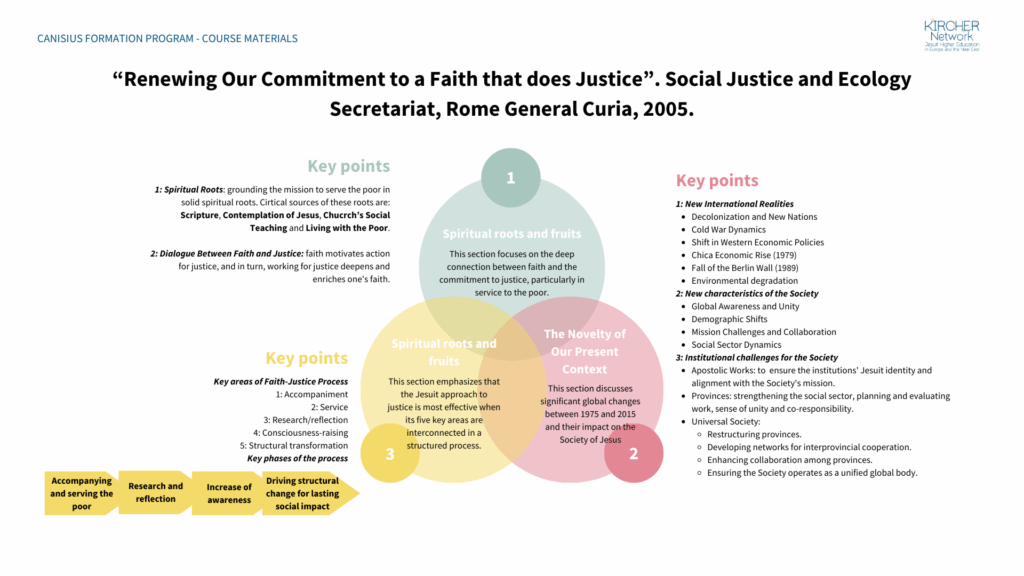
Orienting questions
- Try to identify all the points of the process of the mission where your institutions offers some kind of contribution, which is the main contribution you can offer?
- Who would be other actors you would need to contact in order to complete all the elements of the process of the mission?
- Do you know other Jesuit institutions in your local environment outside your institution?, how do they contribute to the process of the mission?
Additional suggested readings
Article 3: “The University as a source of a Reconciled Life”. Fr. General Arturo Sosa, SJ.
Mind Map
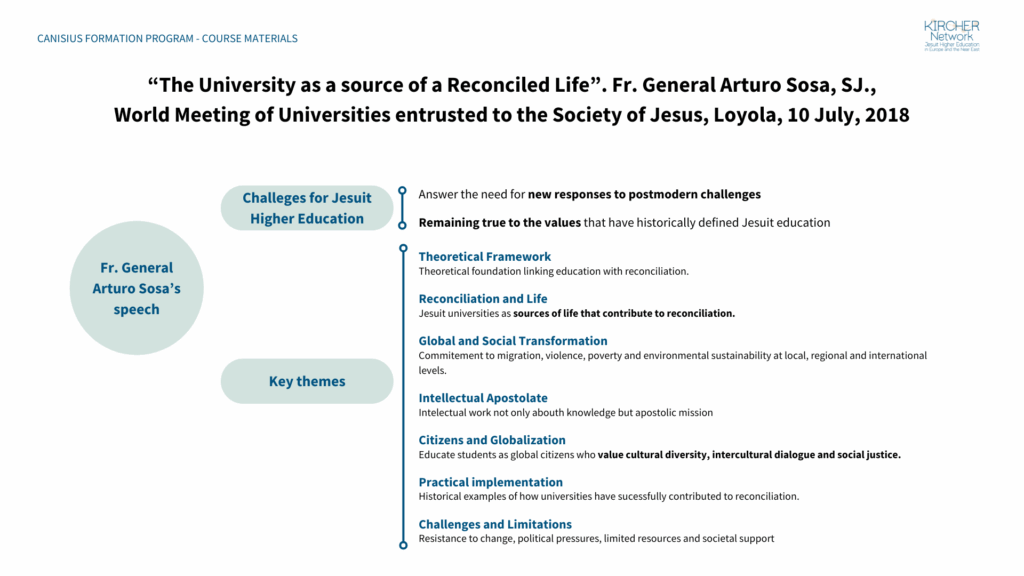
Orienting questions
- The document belongs to a very particular literary genre: an official authoritative document of the Society of Jesus. How to you feel when you read it?, does it speak to you?, How do you see it connecting with your concerns and questions?
- How do you receive the idea of the university as a “project of social transformation”, is that the general image you have of what a University is?, what would you say is your implicit understanding of the mission of an university?, What lights does this understanding of the university offer you?
- Reconciliation is a key word to describe the Jesuit mission since General Congregation 35 (2008) This key concepts is also at the center of Fr. Sosa’s discourse, do you feel compelled by the way the discourse connects the concept of reconciliation with the social reality?, is reconciliation a concept valuable for you as a describer of the university’s mission?, how do you connect your daily work in your institution with the idea of reconciliation?.
- The discourse speaks of wisdom as the knowledge we should acquire in Jesuit higher education, do you like this approach?, is it close or very different to your own understanding of the type of knowledge we create in higher education?, is it inspiring for you?
- Is universal citizenship a good description for you of the ideal profile of our students when they finish their studies with us?, how do the subjects you teach contribute to generate global citizens from your students?
- In which elements of your own institution do you recognize the Jesuit tradition and its humanism that Fr. Sosa describes?
- Try to identity the points of contact and collaboration of your institutions with the networks of the Society of Jesus, what do you learn from them?, how does your work can be enriched by such collaboration?, how do you see such collaboration mark the Jesuit identity of your institution?
Article 4: «Depth, Universality, and Learned Ministry: Challenges to Jesuit Higher Education today» Adolfo Nicolás, SJ.
Mind Map
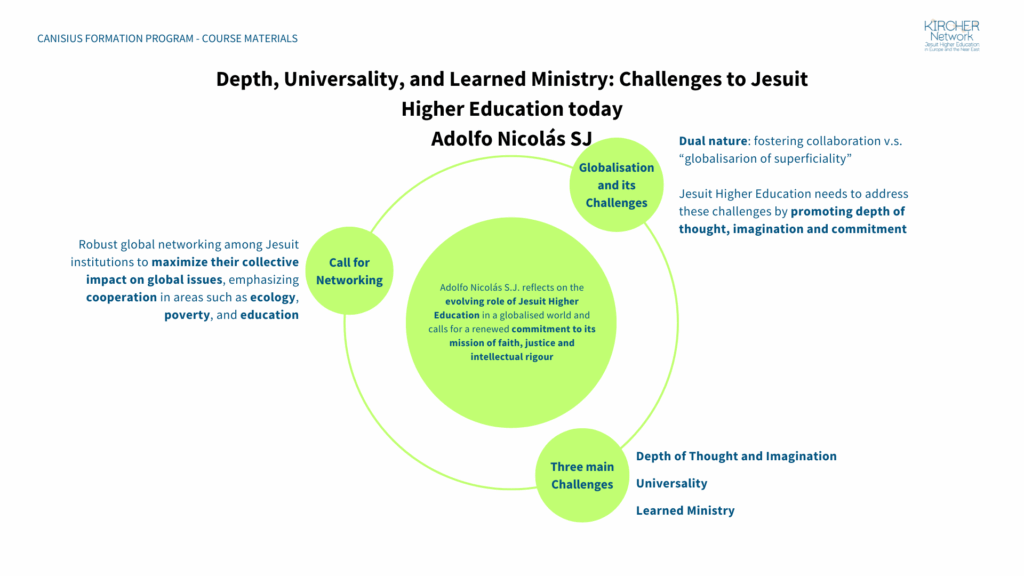
Title:
Teaching Research and Management in a University: Ignatian Keys | Gonzalo Villagrán SJ., and Pep Mària SJ.
Short description
To offer the participants some key elements about the Society’s way of proceeding in teaching, researching (knowledge transfer) and management.
Suggested readings
Article 1: Universal Apostolic Preferences
Mind Map
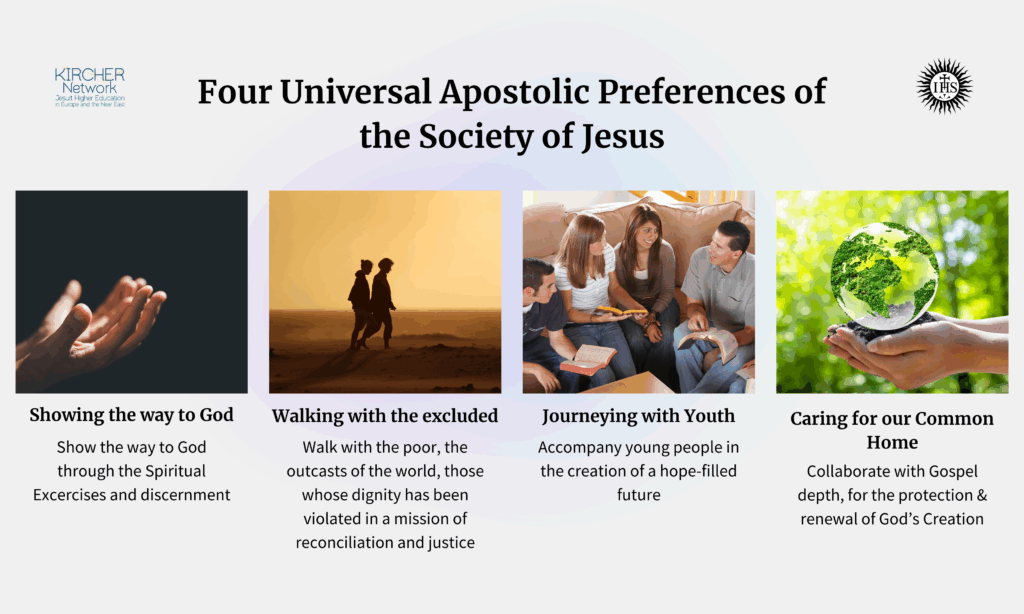
Article 2: «Boston College – Journey into Adulthood: Understanding Student Formation»
Mind Map
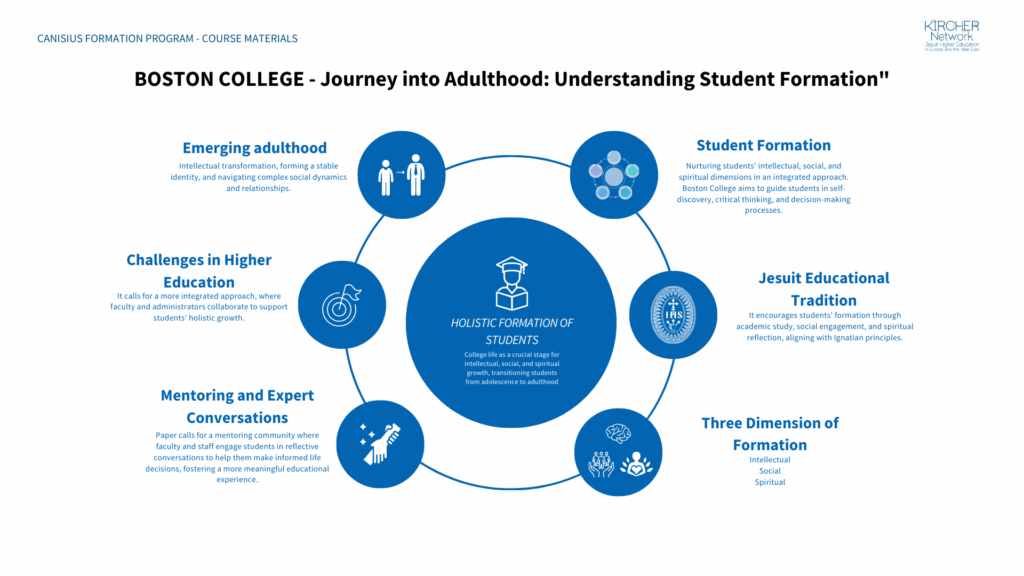
Orienting questions
Experience
- What main “lights” have I discovered? (“light” = clear idea, joyful feeling, activity we are already implementing in my university)
- What “shadows” have I discovered? (“shadow” = confused, unclear idea, sad feeling, activity we are not at all implementing in my university)
Reflection
How do the ideas of the document match/mismatch with my project/dream about my University?
Action
- What actions do I think my university should develop in order to implement the “lights”?
- At the individual level (all educators); at the level of my unit; at the level of the University
- What should we continue doing? What should we stop doing? What should we start doing anew
Article 3: “Research in a University of the Society of Jesus from the Perspective of the Mission” Julio Martínez SJ
Mind Map
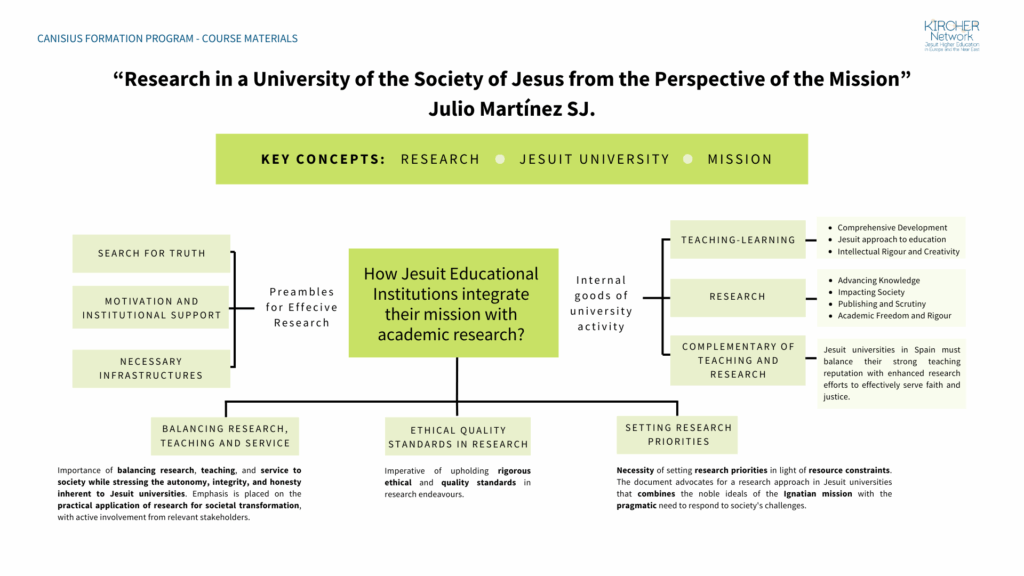
Orienting questions
Same scheme as for the Boston College’s Document.
Apply to your university Julio Martinez’s ideas of
- Interdisciplinarity (p.12)
- What or who are we serving with our research? (p.9)
- Connection between research and Christian faith (p.18)
Other readings
Article 4: “Address to the Georgetown University Board of Directors Given at the Pontifical Gregorian University (Rome – 10 May 2007)” Peter-Hans Kolvenbach SJ.
Mind Map
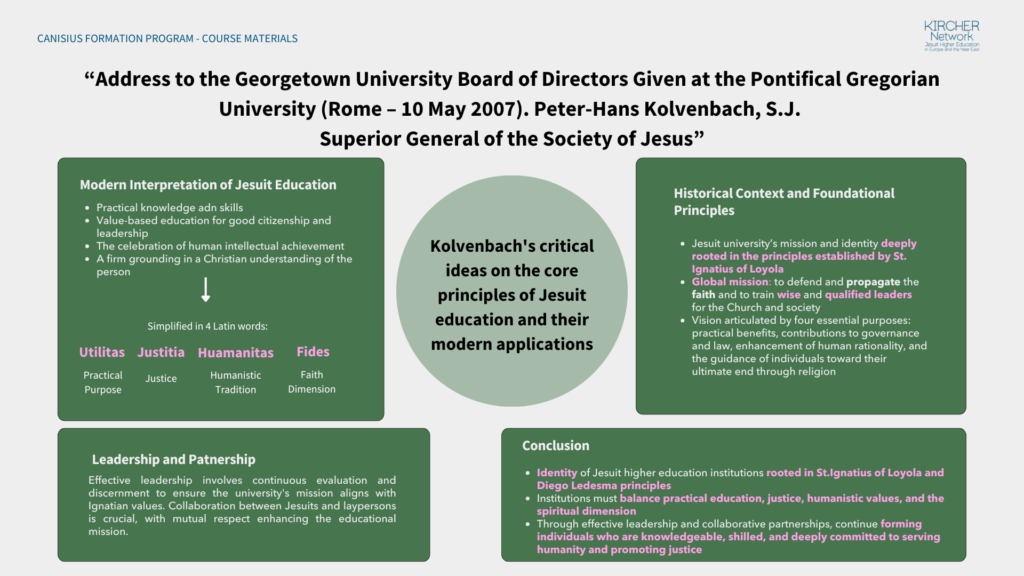
Article 5: «The Call to Leadership of a Jesuit University: Context, Charism, Partnership Board Chairs, Presidents, and Provincials» Arturo Sosa, S.J.
Mind Map
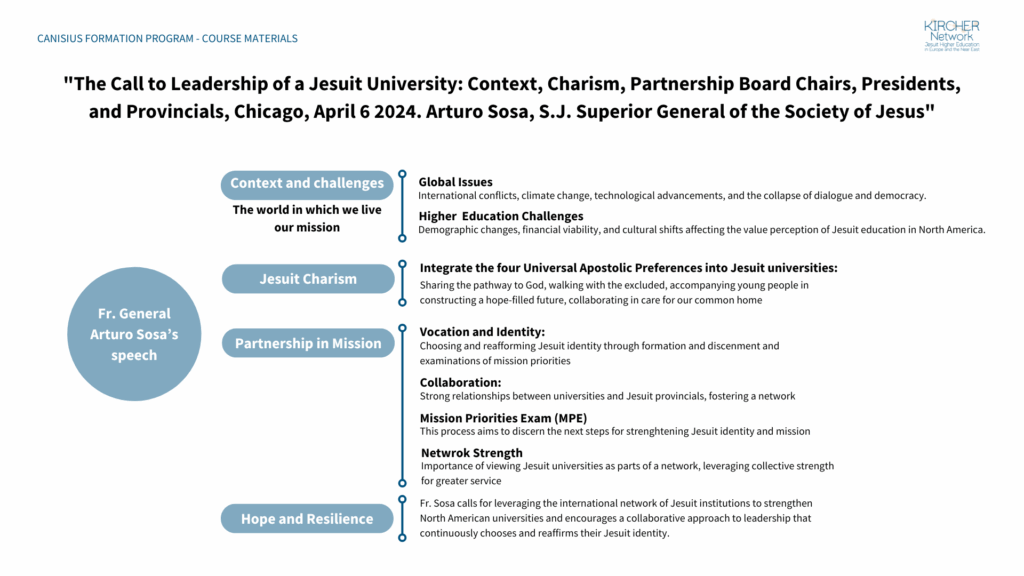
Article 6: “Ignatian Leadership and Human Resource Management» José María Guibert, SJ
Mind Map
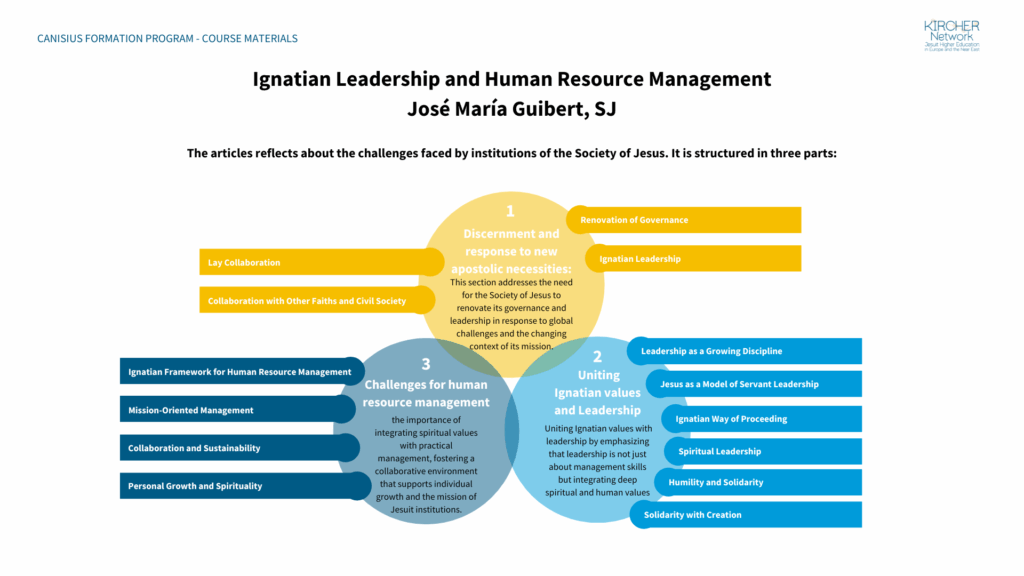
Article 7: A Summary of the Main Characteristics of Jesuit Higher Education
Mind Map
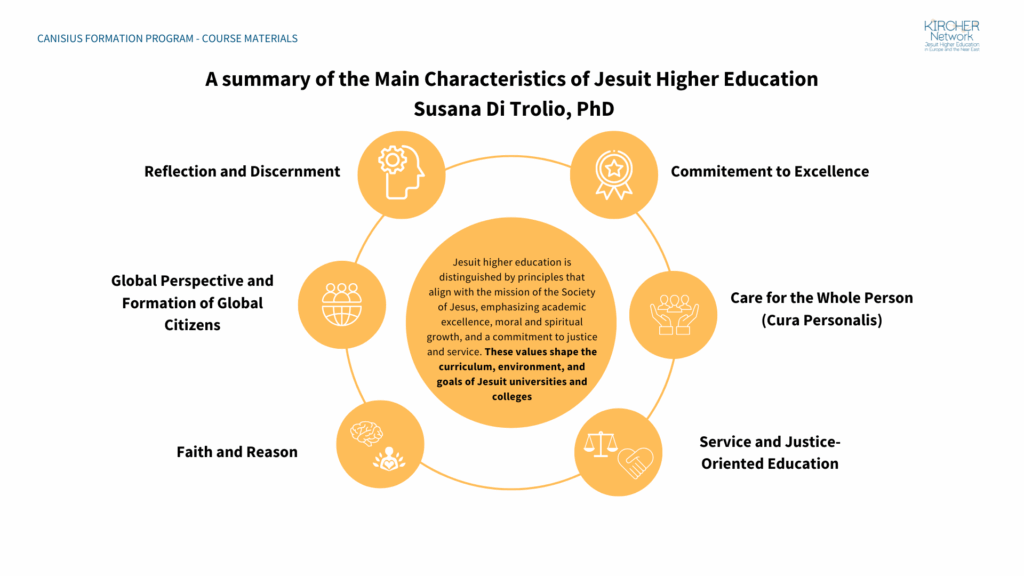
Title:
Jesuit Higher Education Networking: The International Association of Jesuit Universities and the Kircher Network | Philip Geister, SJ., and Susana Di Trolio
Short description
To get to know the Jesuit university networks and their present initiatives as opportunities for developing their professional vocation and work within the universities and centres.
Suggested readings
IAJU Charter and Strategic Plan
Kircher Network Strategic Plan
A Strategic Vision for Jesuit Higher Education Networks Susana Di Trolio, PhD.
(Summary)
Mind maps

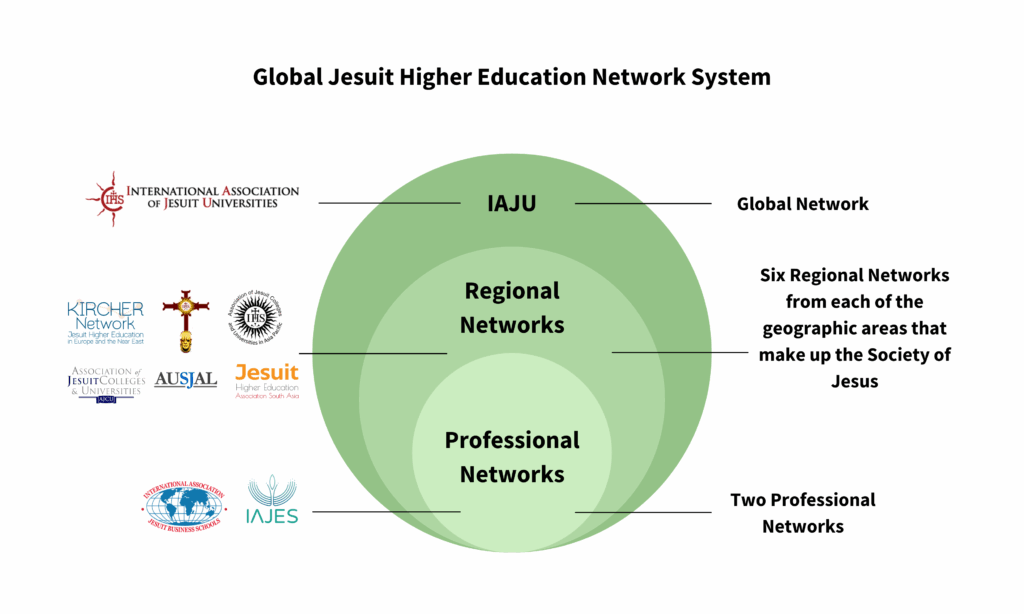
Title:
What is Ignatian leadership? What are the elements of Ignatian leadership?
Speakers: Carlos Losada and David McCallum SJ.
Two sessions:
November 11th, 2:00 pm – Carlos Losada
November 18th, 2:00 pm – David McCallum
Here you can find a glossary with terms that you may encounter in the recommended readings and that will be used throughout the course.
Practical information
three-day in-person sessions
October 21st-23rd
Arrival Oct 20 | Departure Oct 24
TRANSPORTATION OPTIONS
From Bilbao’s Airport to Sanctuary of Loyola
By bus (3 hours and 40 minutes)
Airpot – Bilbao – Ermua – Sanctuary of Loyola
By taxi (49 minutes)
From Bilbao’s Train Station to Sanctuary of Loyola
By train and bus (2 hours and 44minutes)
By taxi
ACCOMMODATION AND COURSE LOCATION
Loyola Spiritual Center. Loiola Auzoa, 15
20730 Azpeitia (Gipuzkoa)
ONLINE SESSIONS
Pre-session – Introductory webinar | Date: Oct 3rd 2025, 15:00 – 16:30 (CET)
Follow-up webinars on Ignatian Leadership
Dr. Carlos Losada | Date: Nov 5th 2025, 16:00 – 17:30 CET
David McCallum, SJ. | Date: Nov 12th 2025, 16:00 – 17:30 CET
Register
Complete the following form to register for attending the course.
Contact
Don’t be shy. Let us know if you have any questions!
Our Newsletter
Don’t miss all the updates from the Kircher Network.
Coordinating team
The course has been organized by a team of people working in Jesuit institutions (Gonzalo Villagrán, SJ., Lidia Fioravanti, and Pep Mària, SJ.) with the support of the Kircher Network’s Executive Secretary, Susana Di Trolio. The organizers will always accompany participants and moderate the sessions.



